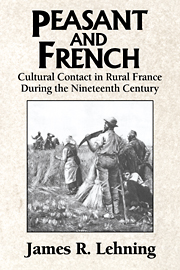Book contents
- Frontmatter
- Contents
- List of tables
- List of figures
- Acknowledgments
- 1 Introductory positions
- 2 The French nation and its peasants
- 3 The landscape in the early nineteenth century
- 4 Changes in the landscape
- 5 Gender, places, people
- 6 The ambiguities of schooling
- 7 Inside the parish church
- 8 A new site: electoral politics
- 9 Conclusion: toward a new rural history
- Sources and references
- Index
8 - A new site: electoral politics
Published online by Cambridge University Press: 23 September 2009
- Frontmatter
- Contents
- List of tables
- List of figures
- Acknowledgments
- 1 Introductory positions
- 2 The French nation and its peasants
- 3 The landscape in the early nineteenth century
- 4 Changes in the landscape
- 5 Gender, places, people
- 6 The ambiguities of schooling
- 7 Inside the parish church
- 8 A new site: electoral politics
- 9 Conclusion: toward a new rural history
- Sources and references
- Index
Summary
The positions of churches and schools on the cultural landscape in the countryside may have changed in the course of the nineteenth century, but they were at least relatively familiar sites. The period after 1848 saw the creation of a new place of contact between “French” culture and its “peasants,” the new institutions of electoral politics. From the first election of the Second Republic in 1848 into the Third Republic, these brought universal manhood suffrage into the countryside and became the principal location of political activity.
In contrast to the French discussions of “peasant” demography, economic behavior, gender, religion, and education, whose authority derived from camouflaging their imposition of a version of “peasant” on the countryside, the electoral arena was explicitly about power and its use. But electoral politics presented a particular version of politics to the countryside, one that defined its character as a site of contact between French and rural cultures by highlighting certain aspects of power and obscuring others. The electoral system of republican France was universalizing, making the substantial claim that through elections it gave power to a nation of equal citizens. The attribution of sovereignty to “the people” that lay at the heart of the Republic's promise of political participation implied the ability of those “people” to exercise that sovereignty; that is, to assume the identity of “citizens.”
- Type
- Chapter
- Information
- Peasant and FrenchCultural Contact in Rural France during the Nineteenth Century, pp. 179 - 203Publisher: Cambridge University PressPrint publication year: 1995



